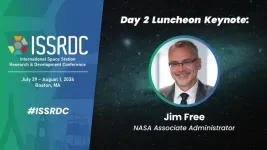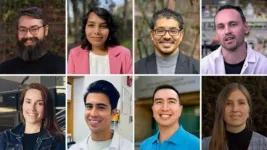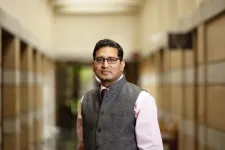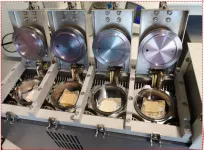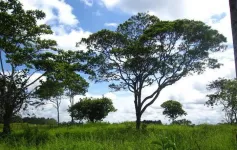Non-native plants and animals expanding ranges 100 times faster than native species, finds new research led by UMass Amherst
Native species cannot move fast enough on their own to avoid climate-driven chaos
2024-06-18
(Press-News.org) June 18, 2024
Non-native Plants and Animals Expanding Ranges 100 Times Faster than Native Species, Finds New Research Led by UMass Amherst
Native species cannot move fast enough on their own to avoid climate-driven chaos
AMHERST, Mass. – An international team of scientists has recently found that non-native species are expanding their ranges many orders of magnitude faster than native ones, in large part due to inadvertent human help. Even seemingly sedentary non-native plants are moving at three times the speed of their native counterparts in a race where, because of the rapid pace of climate change and its effect on habitat, speed matters. To survive, plants and animals need to be shifting their ranges by 3.25 kilometers per year just to keep up with the increasing temperatures and associated climactic shifts—a speed that native species cannot manage without human help. Led by scientists at the University of Massachusetts Amherst, the team includes researchers from New Jersey, Michigan, Colorado and Hawaii in the U.S., as well as Sevilla and Zaragoza in Spain and was published in Annual Reviews of Ecology, Evolution and Systematics.
“We know that the numbers of invasive plant species are increasing exponentially worldwide,” says Bethany Bradley, professor of environmental conservation at UMass Amherst and the paper’s lead author. “We also know that plant nurseries are exacerbating the climate-driven spread of invasives and that confronting invasives is one of the best ways to prepare for climate change. What we wanted to find out is how fast both native and non-native species are moving right now, and how far could they go.”
To figure out how fast species are moving, Bradley and her colleagues comprehensively surveyed a vast trove of previously published papers and publicly available datasets on how far and how fast both native and non-native species, representing different taxa and various ecosystems, have been moving. An important subset of this search was to compile data showing how humans are helping to accelerate the spread of non-native species, either accidentally, such as when a particular species finds itself in a shipping container that travels between continents, or intentionally, when a gardener buys an invasive ornamental from a nursery and drives it back to their home.
The conclusion that Bradley and colleagues reached is that land-based species—including plants—need to be moving at more than 3.25 kilometers per year if they want to stay ahead of climate change, while marine species need to be moving at 2.75 kilometers per year. Unfortunately, native species are only managing to move an average of 1.74 kilometers per year.
Non-native species, however, are spreading at about 35 kilometers per year on their own. When the human role in spreading non-native species is taken into account, then the rate jumps to an astronomical 1,883 kilometers per year—1,000 times faster than the rate at which native species are spreading.
“Essentially,” says Bradley, “there’s no chance for native species to keep up with climate change without human help.”
For the second part of their research, Bradley and colleagues wanted to understand how far both native and non-native species might spread in a warming world, since not every ecosystem is suitable habitat.
While there were fewer case studies for the team to synthesize and analyze, their research indicates that it is likely that non-native species will find more territory to their liking than native species. “However,” says Bradley, “while this means that non-native species might have more territory to gain with climate change, it also means that they’ve got more territory to lose as some range margins become increasingly unsuitable.”
What does this mean, then, for the future?
“It’s really clear that people are very good at moving species, and this is one of the biggest advantages that non-native species have,” says Bradley. “We need to seriously consider and begin implementing assisted migration”—the practice of deliberately helping native species move to more suitable locations—“if our native plants and animals are to stand a chance.”
Contacts: Bethany Bradley, bbradley@eco.umass.edu
Daegan Miller, drmiller@umass.edu
END
ELSE PRESS RELEASES FROM THIS DATE:
2024-06-18
BOSTON (MA), June 18, 2024 – Jim Free, associate administrator for NASA, will deliver a keynote address on Wednesday, July 31, at the International Space Station Research and Development Conference (ISSRDC) in Boston. Free, the senior advisor to Administrator Bill Nelson and Deputy Administrator Pam Melroy, is NASA’s third highest-ranking executive and its highest-ranking civil servant. In addition to leading the agency’s 10 center directors and the mission directorate associate administrators at NASA Headquarters ...
2024-06-18
When people get a prescription for the opioid addiction medication called buprenorphine, they almost always fill it — even if they have to pay more out of their own pocket, a new study shows.
Whether it’s their first prescription for the medication, or they’ve been taking it for months, nearly all patients pick up the order from the pharmacy, according to the new findings from a University of Michigan team. Even among those just starting on buprenorphine, higher costs aren’t a deterrent.
The researchers say this suggests that removing barriers ...
2024-06-18
SEATTLE — June 18, 2024 — Fred Hutch Cancer Center announced the recipients of the 2024 Dr. Eddie Méndez Scholar Award, which recognizes outstanding early-career scientists from underrepresented backgrounds who are studying cancer, infectious diseases and basic sciences.
The eight postdoctoral awardees come from research institutions across the U.S. and are experts in a range of subjects including cancer immunology, fungal model systems and craniofacial development.
“We enthusiastically congratulate this year’s recipients who were chosen from a very competitive pool of candidates,” said Christina Termini, PhD, MM, co-director ...
2024-06-18
NASA, on behalf of the National Oceanic and Atmospheric Administration (NOAA), has selected Lockheed Martin Corp. of Littleton, Colorado, to build the spacecraft for NOAA’s Geostationary Extended Observations (GeoXO) satellite program.
This cost-plus-award-fee contract is valued at approximately $2.27 billion. It includes the development of three spacecraft as well as four options for additional spacecraft. The anticipated period of performance for this contract includes support for 10 years of on-orbit operations and five years of on-orbit storage, for a total of 15 years for each spacecraft. ...
2024-06-18
TUCSON, Ariz., June 18, 2024 — Critical Path Institute (C-Path), a leader in accelerating drug development for rare diseases, today announced the targeted integration of additional Friedreich’s ataxia (FA) datasets into C-Path’s Rare Disease Cures Accelerator-Data and Analytics Platform (RDCA-DAP®) as part of a partnership with Friedreich’s Ataxia Research Alliance (FARA).
This update includes data from two natural history studies; the FA-CHILD study, which focuses on pediatric ...
2024-06-18
In low- and middle-income countries, anemia reduction efforts are often touted as a way to improve educational outcomes and reduce poverty. A new study, co-authored by a global health economics expert from the University of Notre Dame, evaluates the relationship between anemia and school attendance in India, debunking earlier research that could have misguided policy interventions.
Santosh Kumar, associate professor of development and global health economics at Notre Dame’s Keough School of Global Affairs, is co-author of the study, published in Communications ...
2024-06-18
A class of drugs already on the market to lower blood pressure appears to reduce adults’ risk of developing epilepsy, Stanford Medicine researchers and their colleagues have discovered. The finding comes out of an analysis of the medical records of more than 2 million Americans taking blood pressure medications.
The study, published June 17 in JAMA Neurology, suggests that the drugs, called angiotensin receptor blockers, could prevent epilepsy in people at highest risk of the disease, ...
2024-06-18
ACM, the Association for Computing Machinery, today announced the recipients of four prestigious technical awards. These four awards in diverse categories celebrate the hard work and creativity which underpin many of today’s most important technologies.
Prateek Mittal, Princeton University, is the recipient of the 2023 ACM Grace Murray Hopper Award for foundational contributions to safeguarding Internet privacy and security using a cross-layer approach.
The unifying theme in Mittal’s ...
2024-06-18
Viruses, including the coronavirus that causes COVID-19, can get passed from person to person via contaminated surfaces. But can some surfaces reduce the risk of this type of transmission without the help of household disinfectants? As reported in ACS Applied Materials & Interfaces, wood has natural antiviral properties that can reduce the time viruses persist on its surface — and some species of wood are more effective than others at reducing infectivity.
Enveloped viruses, like the coronavirus, can live up to five days on surfaces; nonenveloped viruses, including enteroviruses linked to the common cold, can live for weeks, in some cases even if the ...
2024-06-18
When trees and livestock compete for land, the trees usually lose. It doesn’t have to be this way. But centrally designed plans to implement tree-livestock coexistence in deforested areas don’t always work on faraway farmland.
The ineffectiveness can be due to trying to accomplish too much too quickly. Transforming hundreds of thousands of hectares of treeless or degraded pastures into sustainable landscapes for livestock, nature and people should be a gradual, low-disruption process. And it should start ...
LAST 30 PRESS RELEASES:
[Press-News.org] Non-native plants and animals expanding ranges 100 times faster than native species, finds new research led by UMass Amherst
Native species cannot move fast enough on their own to avoid climate-driven chaos
